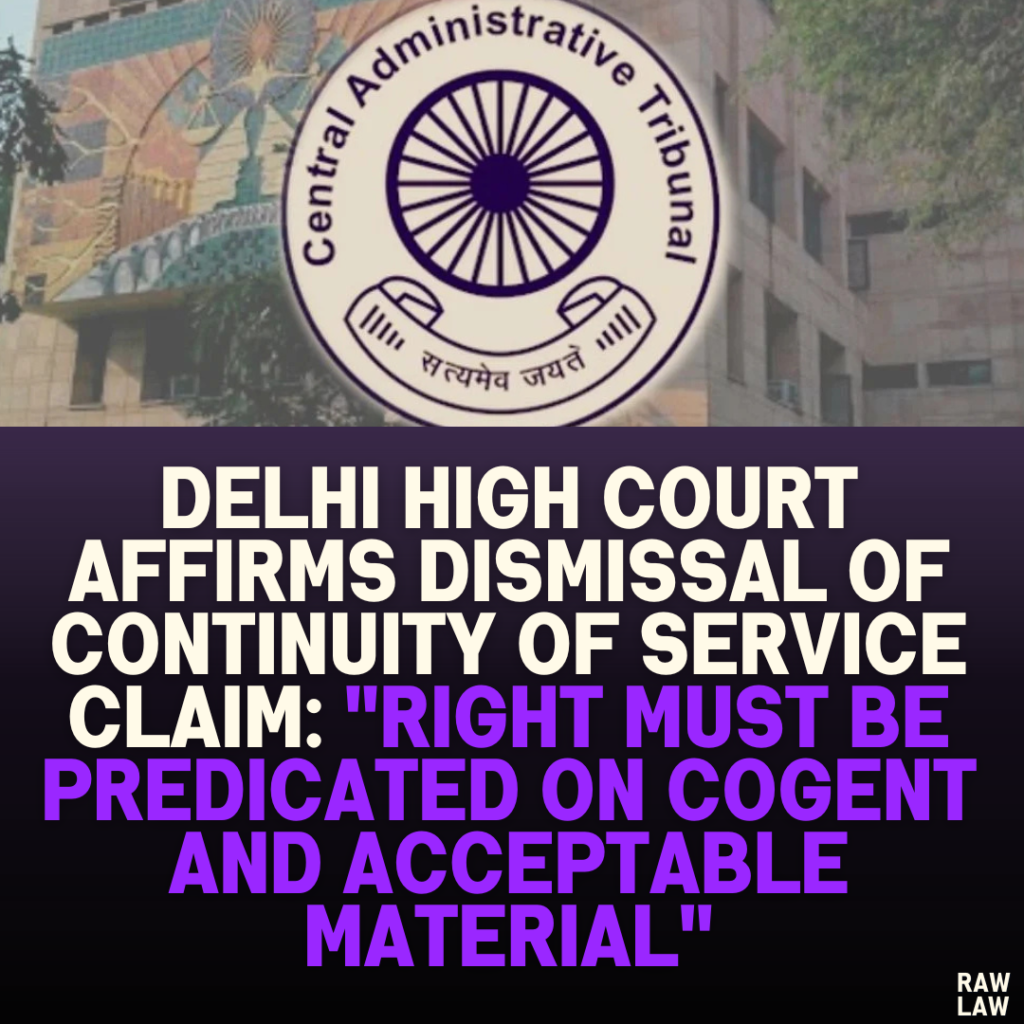Court’s Decision:
The Delhi High Court dismissed the petitioner’s writ petition, upholding the decision of the Central Administrative Tribunal (CAT). The court ruled that the petitioner had failed to establish his claim for continuity of service from 2001, as there was no substantive evidence supporting his regular employment during that period.
The court observed: “It is trite that, in order to seek a remedy, a right must exist. The right must be predicated on cogent and acceptable material.”
Facts:
- Employment History:
- The petitioner had worked with the respondent intermittently since 2001 but was only formally appointed in 2009.
- His employment was regularized in 2011.
- Claim:
- The petitioner approached the Central Administrative Tribunal (CAT), claiming continuity of service from 2001, which would impact his seniority and related benefits.
- Evidence Presented:
- The petitioner relied on identity cards and entry passes issued by the respondent as evidence of his employment.
- He admitted to having no formal appointment order or supporting documentation such as salary slips or attendance records.
- CAT Decision:
- The CAT rejected the claim, stating that identity cards or entry passes do not confer a right to continuity of service.
- Current Proceedings:
- Aggrieved by the CAT’s decision, the petitioner approached the Delhi High Court through a writ petition.
Issues:
- Primary Issue:
- Whether the petitioner could claim continuity of service from 2001 despite lacking any formal evidence of appointment or payment.
- Secondary Issue:
- Whether the judgment in Prem Singh v. State of Uttar Pradesh could be applied to support the petitioner’s claim.
Petitioner’s Arguments:
- Continuity of Service:
- The petitioner argued that he had been working continuously for the respondent since 2001 and was paid in cash during this period.
- He claimed that the lack of formal records should not invalidate his claim.
- Evidence Provided:
- He submitted identity cards and other informal documentation to demonstrate his association with the respondent since 2001.
- Reliance on Prem Singh Judgment:
- The petitioner cited the Supreme Court’s judgment in Prem Singh v. State of Uttar Pradesh [(2019) 10 SCC 516], arguing that his service prior to formal regularization should be considered for continuity.
Respondent’s Arguments:
- Nature of Employment:
- The respondent contended that the petitioner had only been called on an as-needed basis from 2001 to 2009.
- They stated that the petitioner was not a regular employee during this time.
- Lack of Evidence:
- The respondent highlighted the absence of appointment orders, salary slips, attendance records, or any formal documentation to substantiate the petitioner’s claims.
- Payment in Cash:
- They dismissed the petitioner’s claim that he was paid in cash as unsubstantiated.
Analysis of the Law:
- Principle of Legal Rights:
- The court emphasized the principle ubi jus ibi remedium—a legal remedy is available only where a legal right exists.
- For a claim of continuity of service, there must be substantive evidence supporting the existence of that right.
- Inadequate Evidence:
- The court noted that the petitioner lacked critical documentation such as:
- Appointment orders.
- Salary slips showing regular payments.
- Attendance records to demonstrate regular service.
- The court noted that the petitioner lacked critical documentation such as:
- Identity Cards:
- The court reaffirmed the CAT’s finding that identity cards and entry passes alone do not establish continuity of service or regular employment.
Precedent Analysis:
- Prem Singh Case:
- The petitioner relied on Prem Singh v. State of Uttar Pradesh, where the Supreme Court held that service on a work-charged basis could qualify for continuity under certain circumstances.
- In Prem Singh, the petitioner had clear evidence of continuous service on a work-charged basis before regularization.
- Distinguishing Prem Singh from the Current Case:
- The court distinguished the facts, noting that:
- In Prem Singh, there was documented proof of employment.
- The issue in Prem Singh related to the interpretation of specific rules governing retirement benefits, which did not apply here.
- The court distinguished the facts, noting that:
- No Applicability:
- The court held that Prem Singh did not support the petitioner’s claim, as the petitioner had no documentary evidence of his service from 2001 to 2009.
Court’s Reasoning:
- Lack of Evidence:
- The court found that the petitioner failed to provide any substantive proof of regular employment between 2001 and 2009.
- It observed that “the right must be predicated on cogent and acceptable material.”
- CAT’s Decision:
- The court upheld the CAT’s view that identity cards and entry passes do not confer a right to continuity of service.
- Distinction from Prem Singh Case:
- The court explained that Prem Singh involved documented work-charged service, unlike the petitioner’s case, which lacked evidence of continuity.
Conclusion:
- The Delhi High Court dismissed the writ petition, affirming the CAT’s decision.
- It held that the petitioner had no legal right to claim continuity of service from 2001, as there was no credible evidence to substantiate his claim.
Implications:
- Evidence Requirement:
- The judgment reinforces the principle that claims of employment continuity must be backed by substantial evidence.
- Mere reliance on identity cards or informal documentation is insufficient.
- Distinguishing Precedents:
- The case highlights the importance of carefully distinguishing between precedents, as factual differences can render a precedent inapplicable.
- Employer-Employee Disputes:
- The judgment serves as a precedent for employment disputes, emphasizing that intermittent engagement does not constitute continuous service unless supported by formal documentation.



